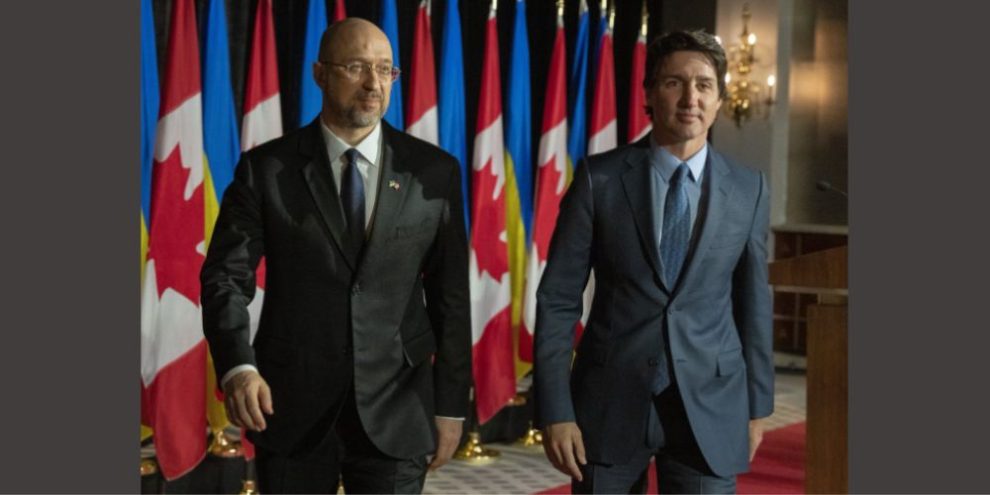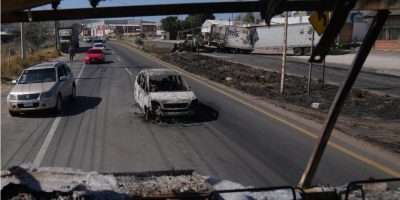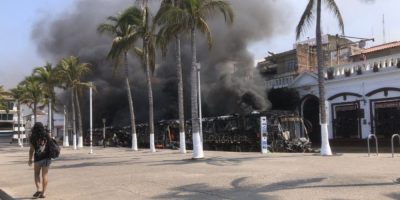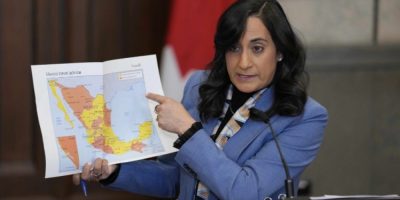
By Lee Berthiaume in Ottawa
Prime Minister Justin Trudeau shrugged off reports of pro-Russian hackers attacking Canadian websites on Tuesday as he used a visit by his Ukrainian counterpart to unveil a package of new military, economic and cultural measures for the embattled country.
The new measures include a donation of assault rifles, machine-guns and ammunition for Ukraine's military as it prepares for a spring of heavy fighting, as well as new and updated agreements around free trade and student exchanges.
Ottawa is also imposing sanctions on an additional 14 Russian individuals and 34 Russian entities, and nine organizations tied to Belarus's financial sector over their support for Moscow's invasion.
"Canada will continue to be steadfast in our support of Ukraine as you defend yourselves heroically against Putin's brutal, barbaric invasion," Trudeau said during a news conference in Toronto with Ukrainian Prime Minister Denys Shmyhal.
Shmyhal, for his part, used the occasion to thank Canada for its support since Russian forces invaded in February 2022, which has included billions of dollars in previously announced economic and military aid.
That includes a $2.4-billion loan through the International Monetary Fund that was announced in last month's federal budget, and which Trudeau said has been fully disbursed.
At the same time, Shmyhal called for the transfer of frozen Russian assets to help Ukraine rebuild, while underscoring the need for additional military assistance as his country's forces prepare to launch a spring counteroffensive to liberate eastern Ukraine.
"They are preparing for our counteroffensive," the Ukrainian prime minister said. "We need more ammunition, we need more weaponry, we need more military equipment."
Shmyhal's visit coincided with several apparent attacks on Canadian websites Tuesday morning, with a group that claims to support Russia taking responsibility.
Among the affected websites were those of the Prime Minister's Office and the Senate, both of which were back up and running by the afternoon.
Asked about the attacks, Trudeau said it was not uncommon for Russian hackers to target countries that support Ukraine, particularly when those countries are hosting a high-level Ukrainian delegation.
"But in case anyone was wondering," Trudeau added, "Russia being able to bring down an official government of Canada web page for a few hours is in no way going to dissuade us from our unshakable support of Ukraine."
Brett Callow, a threat analyst with cybersecurity firm Emsisoft, said hackers appear to have launched a denial-of-service attack by flooding the affected websites — a tactic that has become increasingly common since Russia's invasion of Ukraine.
"Hacktivists like them because while they're disruptive rather than destructive, they're highly visible and often make headlines," Callow said.
Shmyhal's visit also followed on the heels of leaks of top-secret U.S. intelligence documents, which included detailed assessments of the state of Ukrainian and Russian forces — and their losses.
The trove of documents also reportedly included an assessment of claims that Russian-backed hackers managed in February to access the systems controlling part of Canada's natural gas infrastructure.
The New York Times, which reported on those documents Monday, did not name a specific energy company. But it said hackers were instructed by a Russian intelligence officer to maintain access to the computer network and "wait for further instruction."
The Times reported that the hackers were able to show they had the ability to increase valve pressure, disable alarms and trigger an emergency shutdown at an unidentified gas distribution station.
While neither leader directly addressed the leak, Trudeau told reporters: "I can confirm that no physical harm was caused to these pieces of Canadian infrastructure."
The Canadian prime minister also defended the decision to contribute billions of dollars in military and economic aid to Ukraine, describing the war there as emblematic of the larger fight for the principles and values of peace and democracy.
"Authoritarian dictators are looking at Vladimir Putin, curious to see if he will succeed," he said. "Because everywhere in the world, there are neighbours with larger armies than the country beside them saying: 'Oh, wouldn't it be nice to redraw the map?'"
Shmyhal insisted that despite the toll the war has taken on Ukraine and the need for more weapons, his countrymen were committed to continuing the fight against Russia.
"We are tired," he said. "It's natural, because we fight (for) more than one year. ... But we are not exhausted. We are not fatigued."
This report by The Canadian Press was first published April 11, 2023.
Banner image via The Canadian Press





